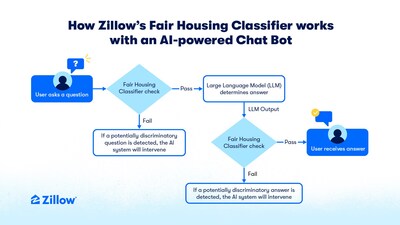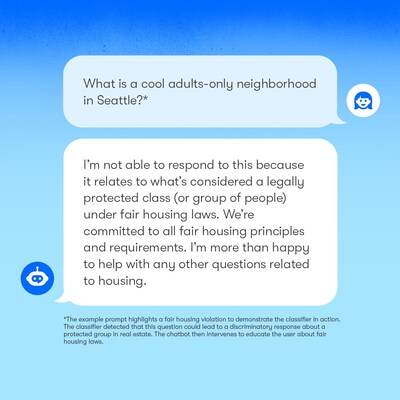Zillow providing open-source technology to promote fair housing in AI-powered real estate conversations
Zillow has created the Fair Housing Classifier for large language models (LLMs) to help others in real estate, civil rights and technology sectors safeguard AI-powered real estate conversations
, /PRNewswire/ — Today, Zillow is releasing its open-source Fair Housing Classifier, which establishes guardrails to promote responsible and unbiased behavior in real estate conversations powered by large language model (LLM) technology.
Many AI tools disregard fair housing requirements and, when deployed, can perpetuate bias and undermine the progress achieved in advocating for fair housing. Zillow’s Fair Housing Classifier focuses on mitigating the risk of illegal steering — the practice of influencing a buyer’s choice of communities based upon the buyer’s legally protected characteristics under federal law.
“Since 2006, Zillow has used AI to bring transparency to home shoppers, powering tools like the Zestimate,” said Josh Weisberg, senior vice president of Artificial Intelligence. “We’ve made it our business to increase transparency in real estate — open sourcing this classifier demonstrates that advancements in technology do not need to come at the expense of equity and fairness for consumers. We’re offering free and easy access so that others in civil rights, tech and real estate sectors can use it, collaborate and help improve it.”
The Fair Housing Classifier acts as a protective measure, to encourage more equitable conversations with AI technology. It detects questions that could lead to discriminatory responses about legally protected groups in real estate experiences, such as search or chatbots. The classifier identifies instances of noncompliance in the input or the output, leaving the decision of how to intervene in the hands of system developers.
“In today’s rapidly evolving AI landscape, promoting safe, secure and trustworthy AI practices in housing and lending is becoming increasingly important to protect consumers against algorithmic harms,” said Michael Akinwumi, Ph.D., chief responsible AI officer at the National Fair Housing Alliance. “Zillow’s open-source approach sets an admirable precedent for responsible innovation. We encourage other organizations and coalition groups to actively participate, test, and enhance the model and share their findings with the public.”
The decision to offer the Fair Housing Classifier as open-source underscores Zillow’s commitment to transparency, equity and fair housing in real estate. Organizations looking to adopt the Fair Housing Classifier can access the code and comprehensive framework on GitHub. Trusted partners who would like to contribute to and enhance the classifier can reach out to the email alias on the GitHub page, through which they can request access to training data and a pretrained model, after presenting a genuine use case. This transparency is key to encouraging contributions to improve the model. Improvements to the Fair Housing Classifier can be submitted via the standard request process on GitHub.
Given the hundreds of millions of Americans searching for housing online today, it’s vital that people are equipped with tools to make getting home more equitable and transparent — and less daunting. Younger generations, renters, LGBTQ+ people and people of color are more likely to say fair housing is an issue facing them and their families, according to a recent Zillow survey of 26 major U.S. metropolitan areas. Although fair housing laws — which ensure equal and nondiscriminatory access to housing — have been in place for nearly 60 years, discrimination remains a stubborn factor in housing, Zillow’s latest Housing Aspirations Report shows. The survey found a majority of respondents (57%) reported experiencing some kind of housing discrimination, with groups such as LGBTQ+ populations reporting discrimination at higher rates. However, overall, only 42% of respondents reported that fair housing impacts them or their families, highlighting how much work is needed to continue to educate people about their rights under fair housing laws.
Making the Fair Housing Classifier available as open-source is just one way that Zillow is innovating its pro-consumer approach. Earlier this year, Zillow’s cross-functional ethical AI team published AI principles, which highlight the company’s commitment to prioritizing equitable outcomes in real estate.
About Zillow Group:
Zillow Group, Inc. (Nasdaq: Z and ZG) is reimagining real estate to make home a reality for more and more people. As the most visited real estate website in the United States, Zillow and its affiliates help people find and get the home they want by connecting them with digital solutions, dedicated partners and agents, and easier buying, selling, financing and renting experiences.
Zillow Group’s affiliates, subsidiaries and brands include Zillow®, Zillow Premier Agent®, Zillow Home Loans℠, Trulia®, Out East®, StreetEasy®, HotPads®, ShowingTime+℠, Spruce® and Follow Up Boss®.
All marks herein are owned by MFTB Holdco, Inc., a Zillow affiliate. Zillow Home Loans, LLC is an Equal Housing Lender, NMLS #10287 (www.nmlsconsumeraccess.org). © 2023 MFTB Holdco, Inc., a Zillow affiliate.
(ZFIN)
SOURCE Zillow






